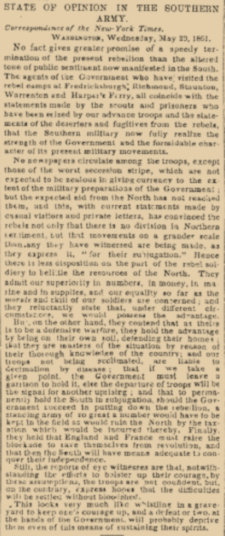The New York Times
May 30, 1861
Correspondence of the New-York Times.
Washington, Wednesday, May 29, 1861.
No fact gives greater promise of a speedy termination of the present rebellion than the altered tone of public sentiment now manifested in the South. The agents of the Government who have visited the rebel camps at Fredricksburgh, Richmond, Staunton, Warrenton and Harper’s Ferry, all coincide with the statements made by the scouts and prisoners who have been seized by our advance troops and the statements of the deserters and fugitives from the rebels, that the Southern military now fully realize the strength of the Government and the formidable character of its present military movements.
No newspapers circulate among the troops, except those of the worst secession stripe, which are not expected to be zealous in giving currency to the extent of the military preparations of the Government; but the expected aid from the North has not reached them, and this, with current statements made by casual visitors and private letters, has convinced the rebels not only that there is no division in Northern sentiment, but that movements on a grander scale than any they have witnessed are being made, as they express it, “for their subjugation.” Hence there is less disposition on the part of the rebel soldiery to belittle the resources of the North. They admit our superiority in numbers, in money, in marine and in supplies, and our equality so far as the morale and skill of our soldiers are concerned; and they reluctantly state that, under different circumstances, we would possess the advantage.
But, on the other hand, they contend that as theirs is to be a defensive warfare, they hold the advantage by being on their own soil, defending their homes; that they are masters of the situation by reason of their thorough knowledge of the country; and our troops not being acclimated, are liable to decimation by disease; that if we take a given point, the Government must leave a garrison to hold it, else the departure of troops will be the signal for another uprising; and that to permanently hold the South in subjugation, should the Government succeed in putting down the rebellion, a standing army of so great a number would have to be kept in the field as would ruin the North by the taxation which would be incurred thereby. Finally, they hold that England and France must raise the blockade to save themselves from revolution, and that then the South will have means adequate to conquer their independence.
Still, the reports of eye witnesses are that, notwithstanding the efforts to bolster up their courage, by these assumptions, the troops are not confident, but, on the contrary, express hopes that the difficulties will be settled without bloodshed.
This looks very much like whistling in a graveyard to keep one’s courage up, and a defeat or two at the hands of the Government, will probably deprive them even of this means of sustaining their spirits.
